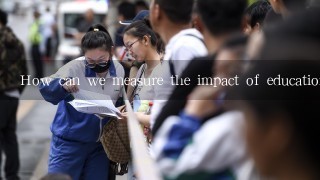How can we measure the impact of education on individuals and society?

Individual Impact
- Academic achievement: Measuring standardized test scores, GPAs, and other academic indicators.
- Career outcomes: Tracking job placement rates, salaries, and career satisfaction.
- Life skills development: Assessing changes in critical thinking, problem-solving, and communication skills.
- Personal growth: Measuring changes in self-esteem, confidence, and life satisfaction.
Societal Impact
- Economic growth: Measuring the contribution of education to national GDP and job creation.
- Social mobility: Tracking changes in educational attainment and social class.
- Civic engagement: Measuring the role of education in fostering civic participation and political engagement.
- Health outcomes: Assessing the impact of education on health outcomes and disease prevention.
- Cultural preservation: Preserving and promoting traditional knowledge and heritage through education.
Measurement Methods
- Surveys: Gathering data from individuals and households through questionnaires or interviews.
- Test scores: Measuring academic achievement on standardized tests.
- Job surveys: Gathering data on career outcomes and satisfaction.
- Life history data: Tracking educational attainment, skills, and life experiences.
- Economic data: Monitoring GDP, job creation, and other economic indicators.
- Demographic data: Tracking changes in educational attainment and social class.
- Statistical analysis: Using data to identify trends and relationships between education and various outcomes.
Challenges
- Data quality: Ensuring the accuracy and completeness of data.
- Bias and confounding factors: Controlling for other factors that may influence outcomes.
- Measurement bias: Ensuring that different measurement methods produce consistent results.
- Longitudinal data: Tracking educational and societal impacts over time.
Conclusion
Measuring the impact of education on individuals and society is a complex and multifaceted task. By employing a variety of measurement methods and considering the challenges, we can gain a comprehensive understanding of the role education plays in shaping human potential and societal well-being.





































































